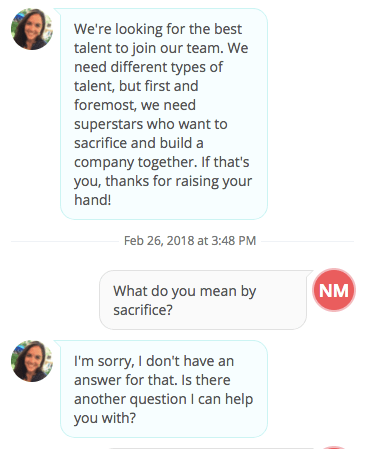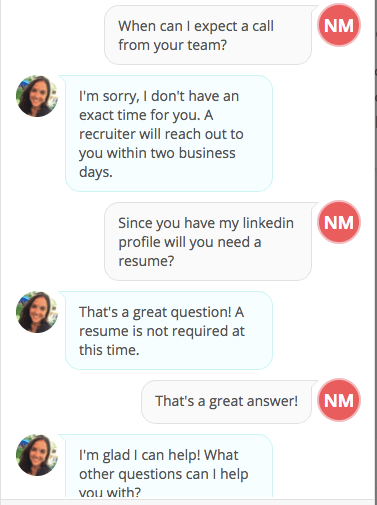These past weeks I’ve been deep into the #HRTech world, tweeting frequently into the void, trying to learn more about increasingly opaque data used in smart HR platforms. Throughout the process I’m documenting the variety of hiring technology on the market, from smart platforms to machine learning for automated resume screening to virtual assistants. Along the way I’ve stumbled on loads of chatbots trying to claim a place for themselves in the hiring process. I’ve got a bit of a crush on chatbot technology so I’ve been trying them out. Two weeks ago I pined for Mya but settled on an interview using TalkPush. Today I found Paradox.ai and gave it a go.

Once again, the intro starts easily enough:

Then I was immediately asked contact details. Mind you, I’m just browsing here, not actually ready to apply. I don’t know if it’s me or what but I’m a bit irritated each time I’m asked for contact details right away (side note: I signed away my LinkedIn data for Wade&Wendy access only to be told post-data exchange that I’m on a waitlist, so maybe I’m just tired of having to give up data to engage). But this is all pretend anyway, so I gave them my phone number and then we moved on to my interests.

I thought here that we might talk about what positions are available but the onus was put on me to define what I want. I actually wasn’t sure what to answer. I like that it’s framed that way but wonder how other job seekers perform when asked this question. Admittedly it caught me off guard and I wasn’t sure what to write. I had to think about it which then sent me down a mini-spiral wondering if they evaluated me on how long it took for me to answer.
Moving along:

This is where it got interesting. They’ll find my profile (and I wonder if they’ll find my other social profiles) for me, so I don’t have to submit anything.

I think there was a hiccup when I shared my non-existent most recent role as the interview ended abruptly. I can’t tell if it’s because a. it’s a bot. b. I’m not a fit. or c. this wasn’t an interview.
Then onto the questions from me. The Q&A started a bit rocky but got better:



So throughout this whole process I wondered: how do you know the difference between a bot that helps you explore job opportunities and one that evaluates you? I misunderstood this bot from the beginning.
I went into it thinking the bot was helping me explore options at the company. But it quickly moves into interview territory by asking my experience level. Then it forces me to automatically apply to the position(s?) we discussed as they pull my LinkedIn profile. What if I hadn’t updated my LinkedIn?
Also, what if I’ve already provided my real name and contact, but wasn’t prepared to discuss my experience, what do I do? If I abandon the convo, and return, how does that affect my evaluation? Am I more desirable because I’m returning? Or am I penalized because I couldn’t answer the prior questions?
I’m so curious what happens on the backend when a recruiter receives the data.
While this experience is certainly efficient it’s hard to get a feel for company culture during these interactions. I was generally curious about the companies that they partner with but didn’t get traction there. Asking about the workplace and getting a canned response about “best talent” and “superstars” doesn’t offer much. If Olivia instead shared a video from the team, or a blog post about a day in the life of a marketer at Paradox, or even a personalized message from the founder that wasn’t full of “superstar” startup speak, it’d instantly provide more value. It’d at least add a personal touch.
Interacting with bots has me wondering how we define candidate engagement within the context of chatbots. Olivia engaged with me but she wasn’t engaging (though she was definitely better than previous bots I’ve engaged with). When the novelty of interacting with recruiting bots wears off (it’s still so very new), I wonder how candidates will view the experience. If there’s a war for talent, how do you expect someone to chose your company if you can’t show off goods? Do bots play a role in wooing candidates? Or are they just there to expedite the hiring process for HR?
And if candidates are expected to show their soft skills, how do employers expect to identify them when the majority of HR tech aims to take humans out of the selection process?

